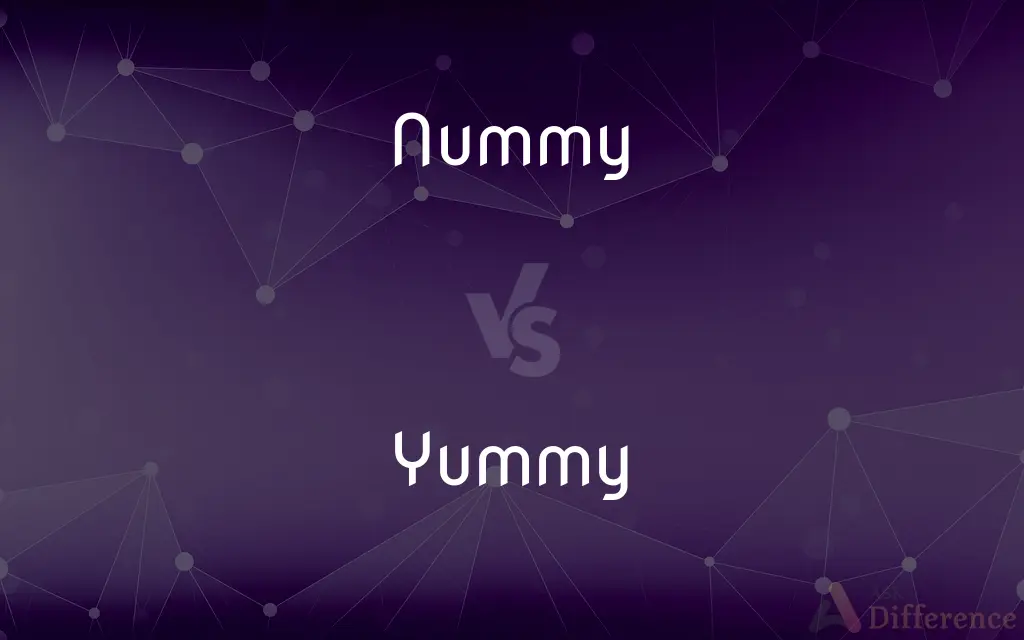Nummy vs. Yummy — What's the Difference?
By Tayyaba Rehman & Fiza Rafique — Updated on May 8, 2024
Nummy, often a childlike expression for tasty, implies a comforting or endearing quality in food, while yummy is a more universally used term to describe deliciousness.

Difference Between Nummy and Yummy
Table of Contents
ADVERTISEMENT
Key Differences
Nummy is typically used in informal contexts and carries a whimsical, almost nostalgic tone, often used when referring to comfort foods or snacks. On the other hand, yummy is a ubiquitous expression that spans various ages and situations, commonly used to signify that something tastes very good.
Nummy can be particularly endearing, suggesting not just taste but a sensory, heartwarming experience. Whereas yummy focuses more broadly on the pleasurable aspect of taste, without the emotional nuance.
In children's language development, "nummy" is often one of the first playful expressions children adopt to describe their food. Whereas "yummy" is recognized and used globally across all age groups, making it a standard part of casual speech about food.
The use of "nummy" can sometimes connote a sense of homemade or traditional dishes, evoking a sense of warmth and home. On the other hand, "yummy" can be applied to any delightful food, from gourmet dishes to simple street food.
While "nummy" is less commonly heard and might be considered more colloquial or region-specific, "yummy" is widely acknowledged and used in various forms of media and advertising, enhancing its familiarity and acceptance.
ADVERTISEMENT
Comparison Chart
Usage Context
Informal, often childlike
Broadly used
Emotional Connotation
Endearing, comforting
Pleasurable, appealing
Common Users
Primarily young children
All age groups
Associated Foods
Comfort foods, snacks
Any delicious food
Frequency in Language
Less common, more colloquial
Very common, widely accepted
Compare with Definitions
Nummy
A cute or endearing way to describe something tasty.
She found the cupcakes very nummy.
Yummy
Often used in marketing and media to convey appeal.
The advertisement promised yummy snacks for all.
Nummy
Suggestive of a warm, pleasant eating experience.
The hot chocolate was nummy on the cold day.
Yummy
Indicates a high level of enjoyment.
The freshly baked pie smelled yummy.
Nummy
Less formal and more personal.
She always called her grandmother’s stew nummy.
Yummy
Describing food that is extremely tasty or delicious.
The new restaurant serves really yummy pasta.
Nummy
Often associated with comfort and simplicity.
He thought the homemade cookies were especially nummy.
Yummy
Universally understood and used across different cultures.
Everyone agreed that the mangoes were yummy.
Nummy
Used mainly in a familial or intimate setting.
The toddler exclaimed that the porridge was nummy.
Yummy
Applicable to a wide range of food types.
That gourmet burger was absolutely yummy.
Nummy
(informal) Delicious.
Yummy
Very pleasing to the taste or smell; delicious.
Yummy
Very pleasant or attractive.
Yummy
Delicious.
Yummy
(slang) yummy mummy
Yummy
Very pleasing or attractive; especially, pleasing to the taste; delicious; scrumptious.
Yummy
Extremely pleasing to the sense of taste
Common Curiosities
What type of foods are most likely to be called "nummy"?
Comfort foods or simple home-cooked meals are often described as "nummy."
Is "nummy" recognized in English dictionaries?
Some modern dictionaries might list "nummy" as slang or informal language.
Is "nummy" appropriate for formal writing?
No, "nummy" is considered informal and typically not suitable for formal contexts.
Can "yummy" be used in professional food reviews?
Yes, although it's informal, "yummy" is acceptable in casual or colloquial food reviews.
Do "nummy" and "yummy" have the same emotional impact?
No, "nummy" often carries more emotional, comforting connotations compared to the broader appeal of "yummy."
What does "yummy" imply in culinary terms?
In culinary terms, "yummy" implies a food item that is universally acknowledged as delicious and appealing.
What is the origin of "nummy"?
"Nummy" originated from a childlike simplification of the word "yummy," used to express pleasure in eating.
Can "yummy" be used to describe non-food items?
Yes, "yummy" can be metaphorically used to describe anything very appealing, not just food.
How do "nummy" and "yummy" differ in usage among different age groups?
"Nummy" is more common among young children, while "yummy" is used universally across all ages.
Are there any cultural differences in the use of "nummy" and "yummy"?
"Nummy" may be more prevalent in certain English-speaking cultures, while "yummy" is universally recognized.
Is "nummy" used globally?
"Nummy" is less widely used and recognized compared to "yummy," with its use more common in specific regions or within families.
Which term is more likely to appear in children’s books?
"Yummy" is more likely to appear due to its universal recognition, though "nummy" may appear in books targeting very young children.
How do advertising industries use the word "yummy"?
The food industry frequently uses "yummy" in advertising to appeal to a broad audience by highlighting taste and enjoyment.
What makes "nummy" distinctive from "yummy" in spoken language?
"Nummy" is often used more intimately and playfully, making it distinctive in informal, personal conversations.
Can "nummy" be used sarcastically?
Yes, like many terms, "nummy" can be used sarcastically in certain contexts.
Share Your Discovery

Previous Comparison
Acknowledge vs. Realize
Next Comparison
Provider vs. PurveyorAuthor Spotlight
Written by
Tayyaba RehmanTayyaba Rehman is a distinguished writer, currently serving as a primary contributor to askdifference.com. As a researcher in semantics and etymology, Tayyaba's passion for the complexity of languages and their distinctions has found a perfect home on the platform. Tayyaba delves into the intricacies of language, distinguishing between commonly confused words and phrases, thereby providing clarity for readers worldwide.
Co-written by
Fiza RafiqueFiza Rafique is a skilled content writer at AskDifference.com, where she meticulously refines and enhances written pieces. Drawing from her vast editorial expertise, Fiza ensures clarity, accuracy, and precision in every article. Passionate about language, she continually seeks to elevate the quality of content for readers worldwide.












































